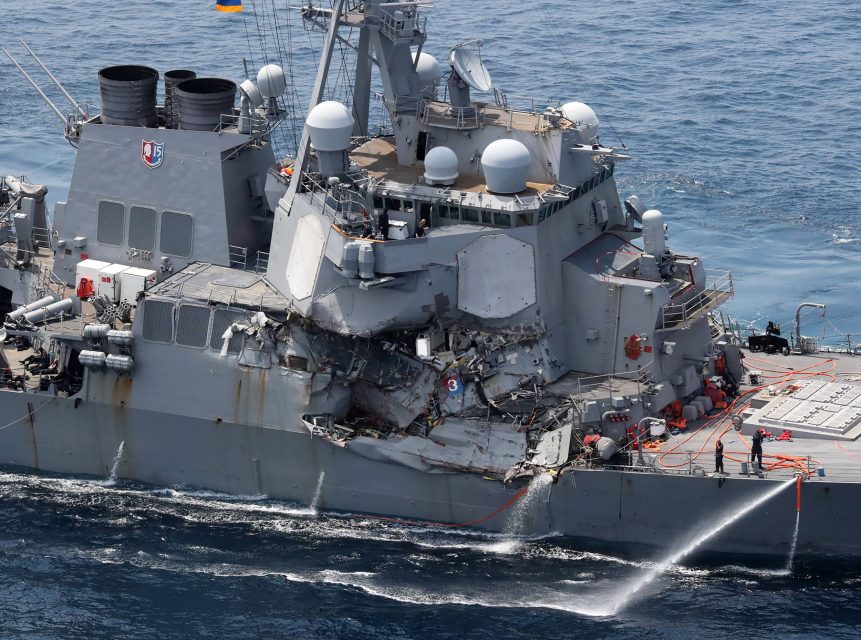
by Kyoko HASEGAWA
Agence France-Presse
TOKYO, Japan (AFP) – A probe into the crash between a US navy destroyer and a Philippine-flagged cargo ship was under way Monday, as the names of seven American sailors who died were made public.
Investigators were looking at how the USS Fitzgerald came to be holed in the smash in a busy shipping lane near its home port.
The container ship, the 222-metre Philippine-flagged ACX Crystal, made a 180 degree turn shortly before the accident, according to data from the Marine Traffic website. It was not immediately clear what prompted the sharp turn.
The US navy and Japan’s coastguard are conducting separate inquiries, but will likely be co-operating, a spokesman for Japan’s transport safety board told AFP.
Japanese coastguard investigators will be interviewing the Filipino crew of the Japanese-owned container ship, although the US has primary jurisdiction in investigating accidents involving military.
Citing local investigators, Japan’s top-selling Yomiuri newspaper said Monday that the damage on both ships suggests they were travelling in the same direction when the crash occurred, 56 nautical miles southwest of Yokosuka.
The impact tore a huge gash in the Fitzgerald, sending gallons of water flooding into the berths where the crew were sleeping.
The bodies of the sailors, who were aged between 19 and 37, were recovered by navy divers after their 154-metre (500-foot) vessel limped into port.
The huge commercial vessel came into Yokosuka with large scrapes on its bow, but none of its 20 crew were injured.
There have been around 30 boat crashes over the past decade in the area, including a 2013 incident when six Japanese crew died after their cargo ship crashed with another vessel in the early morning hours, a coastguard spokesman said.
“That’s considered a lot of accidents,” he said, adding that many ships pass through the channel in the middle of the night to be on time for morning cargo pick-ups.
“There are all kinds of ships navigating those waters.”
Right of way?
Under maritime law, the container ship had an obligation to avoid a collision if it was trying to overtake the destroyer from behind.
But if the container vessel was approaching from the US ship’s right side, the destroyer had the obligation to give way, another Japanese coastguard spokesman said.
“Generally speaking, if a ship sees another vessel on its right hand side it has the obligation to avoid” a collision, he added.
Investigators are sure to put the vessels’ trackable movements under a microscope to figure out what set the deadly crash in motion, said Shoji Fujimoto, a maritime safety expert at Japan’s Kobe University.
“Probably the bulbous bow of the container ship, which is below the waterline, crashed into the hull of the naval ship,” he added, referring to a protuberance at the front of some ships designed to reduce wave resistance.
“Modern-day destroyers’ hulls are made from very thin steel sheets…so they’re vulnerable in a crash.”
On Sunday, US 7th Fleet commander Vice Admiral Joseph Aucoin said the crew would have had little chance of escaping the “tremendous” amount of water that gushed into the ship after the accident tore open its side.
“It was 2:20 in the morning. A significant part of the crew was sleeping,” he told reporters. “There wasn’t a lot of time in spaces that were open to the sea.”
“So, it was traumatic. As to how much warning they had — I don’t know.”
Several other US crew members were injured in the accident and had to be evacuated by air to hospital, including the vessel’s commanding officer Bryce Benson.
He and a couple of other crew members have since been released from hospital.
© Agence France-Presse







